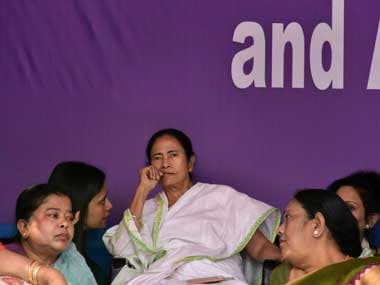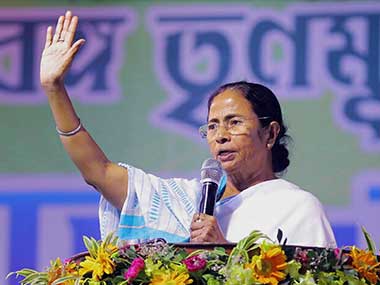To make sense of what is happening in Kolkata, it seems that there is a political tug of war going on over the Saradha scam. To simplify it further, one can say: the BJP is determined to expand its influence in West Bengal, an unchartered territory for the Hindutva forces, and Mamata Banerjee’s Trinamool Congress is retaliating against it to retain its territory. But such simplification will be a gross misreading of the reality.
At the heart of the scam involving the Saradha Group of financial firms lies the interests of over a crore gullible investors spread across Jharkhand, Bihar, Odisha and regions of the North East who have been robbed of their hard-earned money to a group of fraudsters masquerading as entrepreneurs and actively protected by unscrupulous politicians and bureaucrats. In the past seven years, over one hundred people have committed suicide in these regions owing to these brazen frauds known as Ponzi schemes.
The anatomy of these frauds was simple. In the absence of any institutional banking support for daily wage earners in these areas, small investors were roped in with the promise of unrealistically high returns. They often promised to double the investment within three years. Many small investors fell prey to the glib talk of agents who were largely recruited from the local areas. In 2012 the scam exploded as the SEBI asked the group not to take any more money from investors, and agents who found themselves cornered by investors gheraoed the Trinamool Congress office in Kolkata.
Chief Minister Mamata Banerjee then formed a special investigation team (SIT) under the supervision of Rajeev Kumar who held the charge of police commissioner, Bidhan Nagar. Though he started probing the case, it became apparent that the Saradha scheme was just the tip of the iceberg. Frauds of similar nature were perpetrated over the entire eastern and northeastern states. JVG, Rose Valley and many others had robbed lakhs of investors. Ironically, some of these groups even ran media houses and roped in prominent journalists and film stars to burnish their credentials and instil confidence among people.
Unsurprisingly, politicians and bureaucrats turn out to be significant beneficiaries of the systematic loot of the most vulnerable social segment. There is no doubt that Trinamool Congress with its rising political graph was reckoned as the biggest beneficiary when the Supreme Court in 2014 expanded the scope of the investigation and called in the CBI to widen the dragnet. As of now, the scale of the scam that involves Ponzi schemes in West Bengal, Odisha, Jharkhand, Assam, Bihar and elsewhere is estimated to be around over Rs 1 lakh crore.
The history of the case bears significance in the present context as Mamata on Monday sat on dharna in Kolkata to protect Kumar who is suspected to have tinkered with evidence in the scam. Mamata, known for hitting streets and rabble-rousing for populist causes, seems to have reversed her politics in her constitutional role. She is seen as taking the side of the corrupt and protecting a few of her favourites at the expense of masses.
Of course, the CBI sleuths going to the Kolkata police commissioner’s residence without a warrant can be faulted on many counts. There were several alternative ways to handle the situation to deal with a non-cooperating government functionary. For instance, a defiant Lalu Prasad Yadav found himself cornered when he was charge-sheeted in the fodder scam in 1997. He had to resign as chief minister after much protest. A similar, calibrated approach could have been less controversial and more effective.
But consider the way politics has been unfolding in West Bengal. Despite holding a constitutional post, Mamata has been defying every norm of the Constitution. Her government is blocking Prime Minister Narendra Modi’s rallies in West Bengal, banning BJP-organised marches and prohibiting BJP president Amit Shah from holding meetings and yatras in the state. More recently, she literally banned the operations of CBI and Enforcement Directorate (ED) in West Bengal in contravention of federal norms. Apparently, her garrulousness is clearly more than a political fight. She seems to be aggressively pushing boundaries on the issues pertaining to federalism and challenging the authority of the Centre and its jurisdiction.
There is no doubt that Mamata would have found less than a match if Modi were not the prime minister. Modi has a stint as chief minister and now as prime minister, and thus it was naïve to expect that Mamata would go unchallenged. There is no doubt that the attempt to search Kolkata police commissioner’s residence was an overtly political move to assert the Union government’s right and dismiss any delusions that Mamata may be entertaining of being the sole arbiter of defining terms of relations with the Centre.
As expected, she reacted in the manner of a streetfighter but this time for a wrong cause. Remember the image of Mamata being dragged out of the Writers’ Building by Jyoti Basu’s police or holding massive protests wearing simplicity on her sleeves as a leader of the common people? That image of her younger days gets distorted when she is today seen in the company of bureaucrats and political leaders with dubious antecedents.
Perhaps Mamata seemed too impatient to wait for the opposition to rally around her for the 2019 Lok Sabha polls. In the process, she invented a wrong cause to project her leadership. In his lecture on Politics as a Vocation, German sociologist Max Weber writes, “Politics is a strong and slow boring of hard boards. It takes both passion and perspective.” Mamata has enough of passion but she seems to be lacking in perspective in her choice of Modi as her adversary.
source: Firstpost.com








































